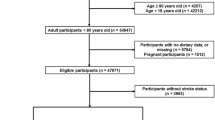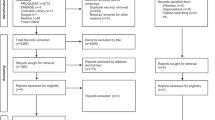Abstract
Stroke, one of the most prevalent geriatric diseases, is a leading cause of death worldwide that often results in permanent physical disability and decreased quality of life, and can have a negative impact on families both financially and emotionally. Although many previous studies have shown relationships between the risk of stroke and nutritional factors, clear dietary recommendations for the prevention and reduction of stroke recurrence have not been established. Several factors should be considered to control and manage stroke. For example, a considerable number of patients with stroke are poorly nourished, have several comorbidities and undesirable health-related behaviors may be present. Stroke patients are less likely to consume beneficial foods, have poorer eating habits and have impoverished dietary quality. In addition, psychological factors such as depression must also be considered in stroke management. Given these factors, dietary recommendations for stroke patients should be established. In this article, we summarized the nutritional status and dietary quality of stroke patients. We also suggested some nutritional guidelines for stroke patients and for those who are at risk for stroke.
This is a preview of subscription content, access via your institution
Access options
Subscribe to this journal
Receive 12 print issues and online access
$259.00 per year
only $21.58 per issue
Buy this article
- Purchase on Springer Link
- Instant access to full article PDF
Prices may be subject to local taxes which are calculated during checkout
Similar content being viewed by others
References
World Health Organization. STEP wise approach to stroke surveillance 2011, [cited 15 December 2011]. Available from: http://www.who.int/chp/steps/stroke/en/index.html.
Strong K, Mathers C, Bonita R . Preventing stroke: saving lives around the world. Lancet Neurol 2007; 6: 182–187.
De Frias CM, Tuokko H, Rosenberg T . Caregiver physical and mental health predicts reactions to caregiving. Aging Ment Health 2005; 9: 331–336.
World Economic Forum. The Global Economic Burden of Non-Communicable Diseases.. Geneva, Switzerland, 2011.
World Health Organization. World Health Report 2004: Changing History. World Health Organization: Geneva, Switzerland, 2004.
Donnan GA, Fisher M, Macleod M, Davis SM . Stroke. Lancet 2008; 371: 1612–1623.
Scharver CH, Hammond CS, Goldstein LB . Post-stroke malnutrition and dysphagia. In: Bales CW, Ritchie CS, (eds). Handbook of Clinical Nutrition and Aging 2nd edn Humana Press: New York, NY, USA), 2009, pp 479–497.
Rizzo M, Corrado E, Coppola G, Muratori I, Novo G, Novo S . Prediction of cardio- and cerebro-vascular events in patients with subclinical carotid atherosclerosis and low HDL-cholesterol. Atherosclerosis 2008; 200: 389–395.
Jonas BS, Mussolino ME . Symptoms of depression as a prospective risk factor for stroke. Psychosom Med 2000; 62: 463–471.
Ostir GV, Berges IM, Ottenbacher A, Ottenbacher KJ . Patterns of change in depression after stroke. J Am Geriatr Soc 2011; 59: 314–320.
Salaycik KJ, Kelly-Hayes M, Beiser A, Nguyen AH, Brady SM, Kase CS et al. Depressive symptoms and risk of stroke: the Framingham Study. Stroke 2007; 38: 16–21.
Willey JZ, Disla N, Moon YP, Paik MC, Sacco RL, Boden-Albala B et al. Early depressed mood after stroke predicts long-term disability: the Northern Manhattan Stroke Study (NOMASS). Stroke 2010; 41: 1896–1900.
Iso H, Stampfer MJ, Manson JE, Rexrode K, Hennekens CH, Colditz GA et al. Prospective study of calcium, potassium, and magnesium intake and risk of stroke in women. Stroke 1999; 30: 1772–1779.
Ascherio A, Rimm EB, Hernan MA, Giovannucci EL, Kawachi I, Stampfer MJ et al. Intake of potassium, magnesium, calcium, and fiber and risk of stroke among US men. Circulation 1998; 98: 1198–1204.
Choi-Kwon S, Yang YH, Kim EK, Jeon MY, Kim JS . Nutritional status in acute stroke: undernutrition versus overnutrition in different stroke subtypes. Acta Neurol Scand 1998; 98: 187–192.
Iso H, Rexrode KM, Stampfer MJ, Manson JE, Colditz GA, Speizer FE et al. Intake of fish and omega-3 fatty acids and risk of stroke in women. JAMA 2001; 285: 304–312.
Johnsen SP, Overvad K, Stripp C, Tjonneland A, Husted SE, Sorensen HT . Intake of fruit and vegetables and the risk of ischemic stroke in a cohort of Danish men and women. Am J Clin Nutr 2003; 78: 57–64.
Liu S, Manson JE, Stampfer MJ, Rexrode KM, Hu FB, Rimm EB et al. Whole grain consumption and risk of ischemic stroke in women: a prospective study. JAMA 2000; 284: 1534–1540.
Larsson SC, Mannisto S, Virtanen MJ, Kontto J, Albanes D, Virtamo J . Dietary fiber and fiber-rich food intake in relation to risk of stroke in male smokers. Eur J Clin Nutr 2009; 63: 1016–1024.
Sauvaget C, Nagano J, Allen N, Grant EJ, Beral V . Intake of animal products and stroke mortality in the Hiroshima/Nagasaki Life Span Study. Int J Epidemiol 2003; 32: 536–543.
He FJ, MacGregor GA . Fortnightly review: beneficial effects of potassium. BMJ 2001; 323: 497–501.
Nagata C, Takatsuka N, Shimizu N, Shimizu H . Sodium intake and risk of death from stroke in Japanese men and women. Stroke 2004; 35: 1543–1547.
Westergren A, Ohlsson O, Rahm Hallberg I . Eating difficulties, complications and nursing interventions during a period of three months after a stroke. J Adv Nurs 2001; 35: 416–426.
Yoo SH, Kim JS, Kwon SU, Yun SC, Koh JY, Kang DW . Undernutrition as a predictor of poor clinical outcomes in acute ischemic stroke patients. Arch Neurol 2008; 65: 39–43.
Crary MA, Carnaby-Mann GD, Miller L, Antonios N, Silliman S . Dysphagia and nutritional status at the time of hospital admission for ischemic stroke. J Stroke Cerebrovasc Dis 2006; 15: 164–171.
Westergren A, Karlsson S, Andersson P, Ohlsson O, Hallberg IR . Eating difficulties, need for assisted eating, nutritional status and pressure ulcers in patients admitted for stroke rehabilitation. J Clin Nurs 2001; 10: 257–269.
Davis JP, Wong AA, Schluter PJ, Henderson RD, O’Sullivan JD, Read SJ . Impact of premorbid undernutrition on outcome in stroke patients. Stroke 2004; 35: 1930–1934.
Food Trial Collaboration, Dennis MS, Lewis SC, Warlow C, . Routine oral nutritional supplementation for stroke patients in hospital (FOOD): a multicentre randomised controlled trial. Lancet 2005; 365: 755–763.
Food Trial Collaboration, Dennis MS, Lewis SC, Warlow C, . Effect of timing and method of enteral tube feeding for dysphagic stroke patients (FOOD): a multicentre randomised controlled trial. Lancet 2005; 365: 764–772.
Martineau J, Bauer JD, Isenring E, Cohen S . Malnutrition determined by the patient-generated subjective global assessment is associated with poor outcomes in acute stroke patients. Clin Nutr 2005; 24: 1073–1077.
Hama S, Kitaoka T, Shigenobu M, Watanabe A, Imura I, Seno H et al. Malnutrition and nonthyroidal illness syndrome after stroke. Metabolism 2005; 54: 699–704.
Poels BJ, Brinkman-Zijlker HG, Dijkstra PU, Postema K . Malnutrition, eating difficulties and feeding dependence in a stroke rehabilitation centre. Disabil Rehabil 2006; 28: 637–643.
Brynningsen PK, Damsgaard EM, Husted SE . Improved nutritional status in elderly patients 6 months after stroke. J Nutr Health Aging 2007; 11: 75–79.
Lim HJ, Choue R . Nutritional status assessed by the Patient-Generated Subjective Global Assessment (PG-SGA) is associated with qualities of diet and life in Korean cerebral infarction patients. Nutrition 2010; 26: 766–771.
FOOD Trial Collaboration. Poor nutritional status on admission predicts poor outcomes after stroke: observational data from the FOOD trial. Stroke 2003; 34: 1450–1456.
Chai J, Chu FC, Chow TW, Shum NC . Prevalence of malnutrition and its risk factors in stroke patients residing in an infirmary. Singapore Med J 2008; 49: 290–296.
Lim H, Choue R . Dietary pattern, nutritional density, and dietary quality were low in patients with cerebral infarction in Korea. Nutr Res 2011; 31: 601–607.
Guigoz Y, Vellas B, Garry PJ . Assessing the nutritional status of the elderly: the Mini Nutritional Assessment as part of the geriatric evaluation. Nutr Rev 1996; 54: S59–S65.
Guigoz Y, Vellas B, Garry PJ . Mini Nutritional Assessment: a practical assessment tool for grading the nutritional state of elderly patients. Facts Res Gerontol 1994; 2: S15–S59.
Hankey GJ . Nutrition and the risk of stroke. Lancet Neurol 2012; 11: 66–81.
Lim HJ, Choue R . Association between poor nutritional status and severe depression in Korean cerebral infarction patients. Nutr Neurosci 2012; 15: 25–30.
Hirvonen T, Virtamo J, Korhonen P, Albanes D, Pietinen P . Intake of flavonoids, carotenoids, vitamins C and E, and risk of stroke in male smokers. Stroke 2000; 31: 2301–2306.
Joshipura KJ, Ascherio A, Manson JE, Stampfer MJ, Rimm EB, Speizer FE et al. Fruit and vegetable intake in relation to risk of ischemic stroke. JAMA 1999; 282: 1233–1239.
Van Duyn MA, Pivonka E . Overview of the health benefits of fruit and vegetable consumption for the dietetics professional: selected literature. J Am Diet Assoc 2000; 100: 1511–1521.
Gillman MW, Cupples LA, Gagnon D, Posner BM, Ellison RC, Castelli WP et al. Protective effect of fruits and vegetables on development of stroke in men. JAMA 1995; 273: 1113–1117.
Kinjo Y, Beral V, Akiba S, Key T, Mizuno S, Appleby P et al. Possible protective effect of milk, meat and fish for cerebrovascular disease mortality in Japan. J Epidemiol 1999; 9: 268–274.
Hu FB . Dietary pattern analysis: a new direction in nutritional epidemiology. Curr Opin Lipidol 2002; 13: 3–9.
Chiuve SE, Rexrode KM, Spiegelman D, Logroscino G, Manson JE, Rimm EB . Primary prevention of stroke by healthy lifestyle. Circulation 2008; 118: 947–954.
O'Donnell MJ, Xavier D, Liu L, Zhang H, Chin SL, Rao-Melacini P et al. Risk factors for ischaemic and intracerebral haemorrhagic stroke in 22 countries (the INTERSTROKE study): a case-control study. Lancet 2010; 376: 112–123.
Seino F, Date C, Nakayama T, Yoshiike N, Yokoyama T, Yamaguchi M et al. Dietary lipids and incidence of cerebral infarction in a Japanese rural community. J Nutr Sci Vitaminol (Tokyo) 1997; 43: 83–99.
Fung TT, Stampfer MJ, Manson JE, Rexrode KM, Willett WC, Hu FB . Prospective study of major dietary patterns and stroke risk in women. Stroke 2004; 35: 2014–2019.
He K, Rimm EB, Merchant A, Rosner BA, Stampfer MJ, Willett WC et al. Fish consumption and risk of stroke in men. JAMA 2002; 288: 3130–3136.
Jamrozik K, Broadhurst RJ, Anderson CS, Stewart-Wynne EG . The role of lifestyle factors in the etiology of stroke. A population-based case-control study in Perth, Western Australia. Stroke 1994; 25: 51–59.
Folsom AR, Rasmussen ML, Chambless LE, Howard G, Cooper LS, Schmidt MI et al. Prospective associations of fasting insulin, body fat distribution, and diabetes with risk of ischemic stroke. The Atherosclerosis Risk in Communities (ARIC) Study Investigators. Diabetes Care 1999; 22: 1077–1083.
Fung TT, Chiuve SE, McCullough ML, Rexrode KM, Logroscino G, Hu FB . Adherence to a DASH-style diet and risk of coronary heart disease and stroke in women. Arch Intern Med 2008; 168: 713–720.
Yau WY, Hankey GJ . Which dietary and lifestyle behaviours may be important in the aetiology (and prevention) of stroke? J Clin Neurosci 2011; 18: 76–80.
Kim S, Haines PS, Siega-Riz AM, Popkin BM . The Diet Quality Index-International (DQI-I) provides an effective tool for cross-national comparison of diet quality as illustrated by China and the United States. J Nutr 2003; 133: 3476–3484.
Foley NC, Salter KL, Robertson J, Teasell RW, Woodbury MG . Which reported estimate of the prevalence of malnutrition after stroke is valid? Stroke 2009; 40: e66–e74.
Author information
Authors and Affiliations
Corresponding author
Ethics declarations
Competing interests
The authors declare no conflict of interest.
Rights and permissions
About this article
Cite this article
Lim, H., Choue, R. Impact of nutritional status and dietary quality on stroke: do we need specific recommendations?. Eur J Clin Nutr 67, 548–554 (2013). https://doi.org/10.1038/ejcn.2013.30
Received:
Accepted:
Published:
Issue Date:
DOI: https://doi.org/10.1038/ejcn.2013.30
Keywords
This article is cited by
-
Association between Oral Frailty and Dietary Variety among Community-Dwelling Older Persons: A Cross-Sectional Study
The Journal of nutrition, health and aging (2021)
-
Post Hospital Discharge Care for Complex Chronic Conditions: the Unique Challenges Facing Stroke Patients in their Homes
Current Cardiovascular Risk Reports (2017)



